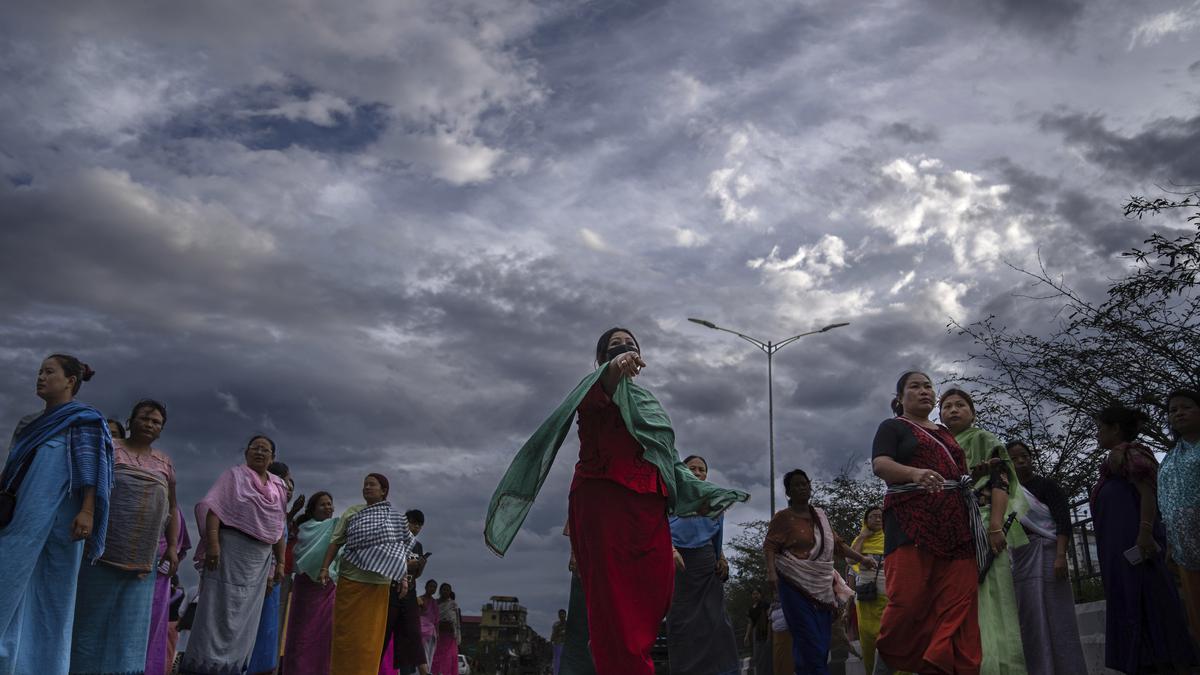
Fresh review petition in Manipur High Court seeks recall of order recommending ST status for Meiteis
The Hindu
After one such protest in Churachandpur on May 3, violence broke out, which quickly spread to rest of the State.
Even as the single-judge Bench of the Manipur High Court is set to hear a review petition filed by the Meitei Tribes Union (MTU) to modify its March 27 order that recommended Scheduled Tribe status for the community, a second review petition has been filed by a tribal body seeking recall of the order.
The second petition was filed by the Tribal Youth Volunteers’ Organization (TYVO), which is based out of Tamenglong district (dominated by Naga tribes) of the State.
Explained | The process of inclusion or exclusion from the Scheduled Tribes list
The second petition argues that the MTU plea should not have been admitted because an appeal against the order is already under the consideration of the court.
On March 27, Acting Chief Justice M.V. Muralidharan passed an order directing the State government in Manipur to recommend the inclusion of the Meitei community in the Scheduled Tribes (ST) list. The order, once made public on April 19, led to widespread protests across the State by both Naga and Kuki-Zomi tribes. After one such protest in Churachandpur on May 3, violence broke out, which quickly spread to rest of the State, taking the shape of the ethnic conflict, which is still continuing.
Within days of the outbreak of violence, tribal bodies led by the All Manipur Tribal Union had filed an appeal against the March 27 order. Hearings have already begun on the appeal, with the Union government submitting that it would not be opposing the appeal. The MTU had objected to the appeal, so had the Manipur government.
However, in the second week of June, as arguments were about to begin on the appeal listed before a Division Bench , the MTU filed a petition, seeking modification of a part of the March 27 order, along with a justification for the delay. Subsequently, the Division Bench said it would wait for the review to be heard before proceeding with the appeal.

“Writing, in general, is a very solitary process,” says Yauvanika Chopra, Associate Director at The New India Foundation (NIF), which, earlier this year, announced the 12th edition of its NIF Book Fellowships for research and scholarship about Indian history after Independence. While authors, in general, are built for it, it can still get very lonely, says Chopra, pointing out that the fellowship’s community support is as valuable as the monetary benefits it offers. “There is a solid community of NIF fellows, trustees, language experts, jury members, all of whom are incredibly competent,” she says. “They really help make authors feel supported from manuscript to publication, so you never feel like you’re struggling through isolation.”

Several principals of government and private schools in Delhi on Tuesday said the Directorate of Education (DoE) circular from a day earlier, directing schools to conduct classes in ‘hybrid’ mode, had caused confusion regarding day-to-day operations as they did not know how many students would return to school from Wednesday and how would teachers instruct in two modes — online and in person — at once. The DoE circular on Monday had also stated that the option to “exercise online mode of education, wherever available, shall vest with the students and their guardians”. Several schoolteachers also expressed confusion regarding the DoE order. A government schoolteacher said he was unsure of how to cope with the resumption of physical classes, given that the order directing government offices to ensure that 50% of the employees work from home is still in place. On Monday, the Commission for Air Quality Management in the National Capital Region and Adjoining Areas (CAQM) had, on the orders of the Supreme Court, directed schools in Delhi-NCR to shift classes to the hybrid mode, following which the DoE had issued the circular. The court had urged the Centre’s pollution watchdog to consider restarting physical classes due to many students missing out on the mid-day meals and lacking the necessary means to attend classes online. The CAQM had, on November 20, asked schools in Delhi-NCR to shift to the online mode of teaching.









